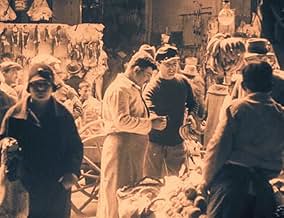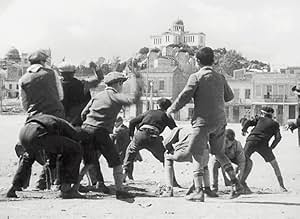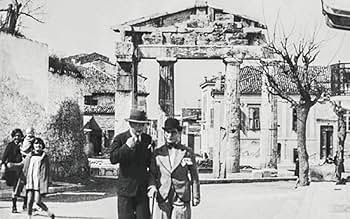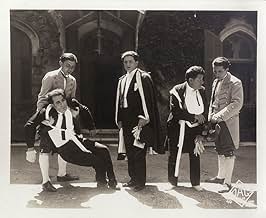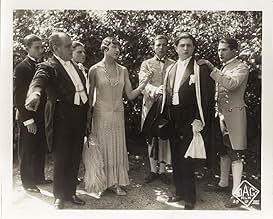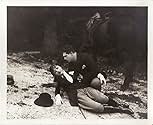Füge eine Handlung in deiner Sprache hinzuKostas saves two naive people from a brutal beating. A pretty seamstress, Titika, who happens to come by, attends to his minor wounds, and they fall in love.Kostas saves two naive people from a brutal beating. A pretty seamstress, Titika, who happens to come by, attends to his minor wounds, and they fall in love.Kostas saves two naive people from a brutal beating. A pretty seamstress, Titika, who happens to come by, attends to his minor wounds, and they fall in love.
Handlung
WUSSTEST DU SCHON:
- WissenswertesThe first Greek film with sound. The soundtrack was recorded on records.
- VerbindungenReferenced in Mousiki vradya: Tragoudia apo ton Elliniko kinimatografo (1976)
Ausgewählte Rezension
"The Apaches of Athens," a title which Jay Weissberg, director of the Pordenone Silent Film Festival, from which I saw this Greek late silent film, assures has nothing to do with Native Americans (I prefer the French title, which translates as "The Prince of Beggars"), comes across, however, as a bait-and-switch narratively. I like how it begins with images of the Acropolis and, then, of a mansion and the modern city of Athens, before transitioning to the poorer Plaka quarter. Despite the historical milieu, the film seems quite modern in its early scenes with the focus on the more impoverished, working-class members of its country's citizenry, and it lives up to its claim as a "dramatic comedy" early on. There's an extended gag regarding the so-called neighborhood "Prince" refusing to get out of bed in his attic room. On the dramatic and romantic side, there are shades of Lillian Gish in "Broken Blossoms" (1919), with the way the girl is abused by her mother, and of Virginia Cherrill in "City Lights" (1931) with her being a poor flower saleswoman. Charlie Chaplin even appears on one of the cards adorning the Prince's attic walls. But, then, the production's leisurely pacing becomes more glaring, and its classist fairy tale more apparent with its treatment of the nouveau riche and nobility.
We get the trope of the boy rescuing another girl, who is of that new-money family, from her runaway horse. They meet up again in a lengthy garden party in the Prince's honor, as he is hired to pretend to be an actual, royal Prince for some ridiculous revenge scheme from the girl's father's assistant, who was laughed at when he asked for the daughter's hand in marriage. So, it's the usual love triangle with one woman being rich and the other poor. The Prince moves back and forth between wealth and poverty in another way, too, besides masquerading as a real Prince. A title card alludes early on that although he's always lived in poverty, he's actually of some noble birth. It doesn't help this cinematic adoration of blue-blooded money that the pacing falls apart in the end. The camera sits on the actors' solemn faces for far too long. There's even a shot of the side of a house that the Prince turns out to be looking back at that lasts some 30 seconds. There's not a lot going on throughout the picture, anyways, but, still, this one needed more editing. On the other hand, the cuts to the gossiping women during the party work well. Too bad it's all in service of exploiting prejudices of the nouveau riche as easily duped and of the virtuousness of old money, all the while offering Depression-era movie audiences a fluffy fantasy of unearned opulence. Nevertheless, I'm happy to have now seen a Greek silent film.
(Note: Once considered a lost film, it was restored from a 35mm nitrate print found at the Cinémathèque française a few years ago and received a 4k digital transfer for the Pordenone screening. The sound discs for what is considered Greece's first synchronized-sound film (a silent film with a recorded score, that is) remain lost, though. The orchestral score for this one reportedly employs recordings from the period of the film as well as newer additions. Although I appreciate the effort and understand that it's based on an operetta (and there is music seen in the film being played), I found the singing to be rather distracting for a silent film, especially when they were given subtitles in my streaming of it, and although the songs are lovely enough on their own. But, that's a minor complaint for an otherwise great presentation.)
We get the trope of the boy rescuing another girl, who is of that new-money family, from her runaway horse. They meet up again in a lengthy garden party in the Prince's honor, as he is hired to pretend to be an actual, royal Prince for some ridiculous revenge scheme from the girl's father's assistant, who was laughed at when he asked for the daughter's hand in marriage. So, it's the usual love triangle with one woman being rich and the other poor. The Prince moves back and forth between wealth and poverty in another way, too, besides masquerading as a real Prince. A title card alludes early on that although he's always lived in poverty, he's actually of some noble birth. It doesn't help this cinematic adoration of blue-blooded money that the pacing falls apart in the end. The camera sits on the actors' solemn faces for far too long. There's even a shot of the side of a house that the Prince turns out to be looking back at that lasts some 30 seconds. There's not a lot going on throughout the picture, anyways, but, still, this one needed more editing. On the other hand, the cuts to the gossiping women during the party work well. Too bad it's all in service of exploiting prejudices of the nouveau riche as easily duped and of the virtuousness of old money, all the while offering Depression-era movie audiences a fluffy fantasy of unearned opulence. Nevertheless, I'm happy to have now seen a Greek silent film.
(Note: Once considered a lost film, it was restored from a 35mm nitrate print found at the Cinémathèque française a few years ago and received a 4k digital transfer for the Pordenone screening. The sound discs for what is considered Greece's first synchronized-sound film (a silent film with a recorded score, that is) remain lost, though. The orchestral score for this one reportedly employs recordings from the period of the film as well as newer additions. Although I appreciate the effort and understand that it's based on an operetta (and there is music seen in the film being played), I found the singing to be rather distracting for a silent film, especially when they were given subtitles in my streaming of it, and although the songs are lovely enough on their own. But, that's a minor complaint for an otherwise great presentation.)
- Cineanalyst
- 7. Okt. 2020
- Permalink
Top-Auswahl
Melde dich zum Bewerten an und greife auf die Watchlist für personalisierte Empfehlungen zu.
Details
- Erscheinungsdatum
- Herkunftsland
- Sprache
- Auch bekannt als
- Apaches of Athens
- Drehorte
- Produktionsfirma
- Weitere beteiligte Unternehmen bei IMDbPro anzeigen
- Laufzeit1 Stunde 32 Minuten
- Farbe
- Sound-Mix
Zu dieser Seite beitragen
Bearbeitung vorschlagen oder fehlenden Inhalt hinzufügen

Oberste Lücke
By what name was Oi apahides ton Athinon (1930) officially released in Canada in English?
Antwort
